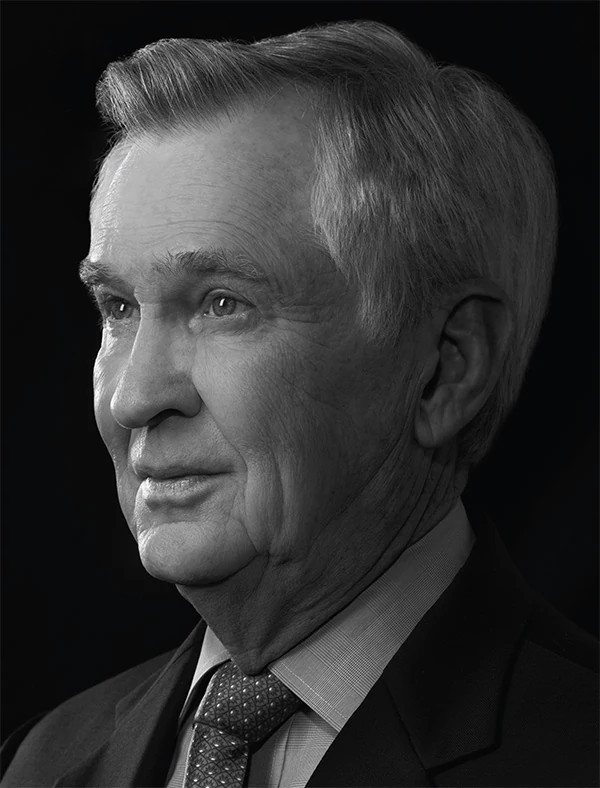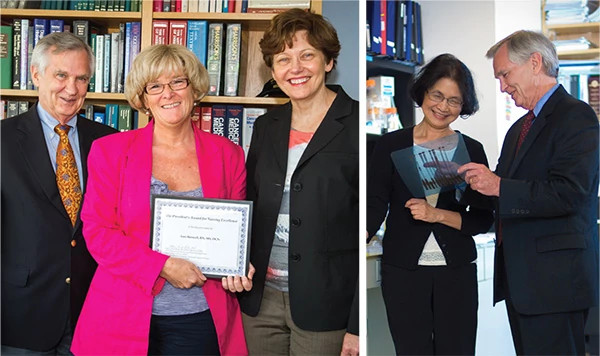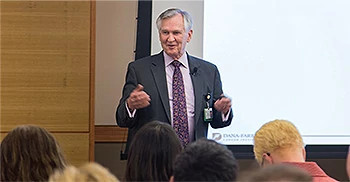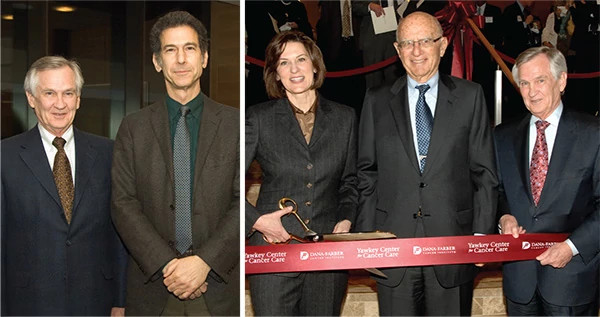Hands-On Leadership
From Paths of Progress 2016


Dana-Farber President and CEO Edward J. Benz Jr., MD, Steps Down After an Era of Innovation and Expansion
by Saul Wisnia
In nearly 25 years of heading major institutions of academic medicine, Edward J. Benz Jr., MD, has earned nearly as much praise for his people skills as for his clinical and research expertise.
Now, as he prepares to vacate his Dana-Farber leadership roles after 16 years as president and CEO, Benz admits this was not always the case.
While attending Catholic high school in his native Allentown, Pa., Benz once offended the nun teaching his sophomore biology class by correctly stating that there were 46 chromosomes in human cells – not 48, as she insisted. The irate instructor sent Benz to confession after forcing him to write "Man has 48 chromosomes" 500 times on a classroom chalkboard.
"What did you tell the priest?" she later asked Benz.
"I told him I lied, 500 times," the headstrong 15-year-old quipped.
Benz jokes that his people skills have improved a little through the decades. Along with his passion and vision, they have served him well since late 2000, when he succeeded David G. Nathan, MD, as Dana-Farber president.
The esteem and affection that Dana-Farber staff members have for Benz, who will step down from his position at the end of 2016, is genuine. During a period of dramatic change in the world of health care funding and delivery, a focus on Dana-Farber's multiple missions of research, care, and training the next generation of leaders – along with the employees devoted to delivering them – has remained his top priority.
"Ed embodies our mission, and provides its heart and soul," says Craig Bunnell, MD, MPH, chief medical officer, Dana-Farber. "His commitment is evident to everyone, shining through when you see him speak or even when you read his emails. He has a passion about the organization and what we do here that sets the tone for all of us."

A Return to His Roots
Taking the reins at Dana-Farber marked a homecoming for Benz, who in the 1970s had been President Emeritus Nathan's student – and later his colleague – at Harvard Medical School. Like his mentor, Benz emerged as a world-renowned hematologist, and led medical programs at Yale, the University of Pittsburgh, and Johns Hopkins University School of Medicine.
When Benz returned to Boston's Longwood Medical Area in 2000, he arrived at a Dana-Farber poised for dramatic growth. After a half-century during which its facilities remained within shouting distance of founder Sidney Farber's original basement laboratory at Boston Children's Hospital, Dana-Farber expanded during Benz's tenure to include several campuses across the city, as well as satellite facilities and hospital partnerships throughout New England, and abroad.
"As cancer care has evolved, Ed has adapted our organization to thrive in new settings while maintaining the core of what we do so uniquely well," says Elizabeth Liebow, the Institute's senior vice president of Business Development, Clinical Planning, and Community Site Operations. "Under his leadership, we have evolved our delivery of services to be more convenient and accessible for patients and their families – including treatment options closer to their homes."

Back on its main campus, while Dana-Farber has remained an outpatient facility, its joint ventures with neighboring Longwood hospitals – Dana-Farber Brigham Cancer Center and Dana-Farber/Boston Children's Cancer and Blood Disorders Center – have grown and flourished.
"Ed is a clear, careful, logical thinker who listens," says Elizabeth Nabel, MD, president, Brigham and Women's Health Care. "He weighs the pros and cons and works to develop win-win solutions. He fosters collaboration. He possesses all of the skills that are required to be a highly effective leader in our complex industry."
Dana-Farber's rising stature during Benz's tenure supports this view. Its regional reputation long since established, the organization is now annually recognized as among the top cancer centers in the United States. In 2015, U.S. News and World Report ranked Dana-Farber/Boston Children's as the nation's leading pediatric cancer program for the second straight year, while the adult program at Dana-Farber Brigham Cancer Center was the highest-ranked in New England for the 15th consecutive time – as well as fourth nationwide.
"He has not only expanded the resources – both physical and intellectual – but has also left us in as solid a position as possible," says his predecessor, Nathan. "It's hard to find someone equal parts clinician and scientist, but Ed is that while also possessing a keen understanding of management. It's been a superb combination for us."
Bridge Builder
The bridges to Dana-Farber's inpatient partners now extend from gleaming new facilities built during Benz's administration, the Yawkey Center for Cancer Care and a completely refurbished Jimmy Fund Clinic. Their design and construction included input not only from caregivers and administrative staff, but also from adult and pediatric Patient and Family Advisory Councils, which have had a strong voice at Dana-Farber throughout Benz's tenure. Indeed, many organizations look to Dana-Farber as a leader in patient-centered care.

"He's always talked about that inclusiveness of patients and families in thinking, planning, organizational strategy, managing risk and safety, and quality," says Patricia Reid Ponte, RN, DNSc, FAAN, senior vice president for Patient Care Services and chief nursing officer at Dana-Farber. "As a physician or a leader of a team, you need that inclusive approach to planning and decision-making."
Throughout his time as president, Benz has championed basic science research at the Institute. Early on, he recognized that genomics – the study of the complete set of DNA within cells – would become a cornerstone of cancer research. He supported Dana-Farber's alliance with the Broad Institute of MIT and Harvard, giving Dana-Farber scientists access to some of the most advanced technology for tracking the links between genetic mutations and cancer.
Benz also spearheaded Dana-Farber's investment in cancer chemical biology, making the Institute, for the first time, a center for the development of compounds that can become new targeted therapies for cancer, including a class of drugs designed to destroy, rather than merely block, cancer-related proteins in cells. Benz's influence also extended to the establishment of Integrative Research Centers, which provide collaboration technology platforms to researchers across the Institute, from laboratory scientists to those who translate basic science advances into new therapies for patients. Among these centers is the Lurie Family Imaging Center, which uses advanced technology to detect cancer and evaluate how well it responds to potential treatments.

A key component of Benz's vision of Dana-Farber's role in the early development of new cancer drugs is the Robert and Renée Belfer Center for Applied Cancer Science, opened in 2006. The Belfer Center serves as a magnet for collaborations between Dana-Farber scientists and pharmaceutical companies, speeding the process by which promising scientific leads are converted into new and better therapies.
A physician-scientist by training, Benz also has a strong grasp of melding research with clinical care. Dana-Farber is a leader in the development of clinical trials, the ultimate embodiment of the "bench-to-bedside" concept embraced by Institute founder Sidney Farber, MD. The number of clinical trials per year has steadily increased. And, with the leadership of Chief Scientific Officer Barrett Rollins, MD, PhD, and in close collaboration with Brigham and Women's Hospital and Boston Children's Hospital, Benz helped launch Profile, one of the nation's most comprehensive precision cancer medicine research initiatives.
Benz has also been a strong advocate for growing both areas of the Institute. In an era of decreased federal funding for cancer research, he moved quickly on the opportunity to make Dana-Farber the lead tenant in the brand-new Longwood Center, with portions of five floors dedicated to the Linde Family Program in Clinical Chemical Biology, the Blais Proteomics Center, and programs in computational biology and biostatistics. Located just across the street from Dana-Farber's main campus, the space – which opened in 2015 – also houses the Belfer Center, a fully integrated, collaborative cancer research center focused on translating today's innovative oncology research into tomorrow's treatments.

Assuring that people from all backgrounds have the ability to benefit from such developments as employees or patients, Benz focused on establishing initiatives to increase the number of women and minority faculty and managers at Dana-Farber. Further programs focused on eliminating racial, ethnic, and socioeconomic disparities in cancer prevention, outcomes, and care. In 2013, Dana-Farber partnered with Whittier Street Health Center to establish a cancer clinic in Boston's Roxbury neighborhood. Thought to be the first dedicated cancer clinic in a community health center, it was named for Benz to honor his commitment to making it a reality.
"In reaching out to communities that have not previously had access to our resources, he had the ability to be proactive rather than reactive," says Karen Burns White, MS, deputy associate director of the Initiative to Eliminate Cancer Disparities. Adds Christopher Lathan, MD, MS, MPH, faculty director for the Cancer Care Equity Program, "Our disparities program would not exist, on many levels, without his involvement. Ed's compassion and intelligence allow him to understand patients from all socioeconomic and racial backgrounds."
This commitment has extended into some of the world's poorest locales. The Center for Global Cancer Medicine at Dana-Farber provides care, education, new facilities, and research expertise to the people of Rwanda and Haiti – in many cases the first cancer treatment these individuals have ever received.
Always on the Move
All these developments have meant many more people coming to Dana-Farber for work or care. Staff size tripled during Benz's tenure to more than 4,000 full-time staff, as did patient volume, and fundraising became another hallmark of the Benz presidency.

A $1 billion capital campaign during his tenure, the first ever at a New England hospital, helped to build the Yawkey Center, and giving remained strong even during a global economic downturn. Susan Paresky, senior vice president for Development and the Jimmy Fund, can count on Benz to show up at donor events to passionately and effectively explain the most important research and clinical areas needing support.
The already-palpable power of Dana-Farber's Jimmy Fund expanded through the growing appeal of iconic events like the WEEI/NESN Jimmy Fund Radio-Telethon and Jimmy Fund Scooper Bowl®, and through the dedication of fundraising partners like the Pan-Mass Challenge bike-a-thon. Benz not only touted these staples on the New England fundraising calendar, he also participated in them himself – even when doing so took some multitasking.
"I can remember him completing the Boston Marathon® Jimmy Fund Walk one warm September afternoon, and then going into the Fairmount Copley Plaza right near the finish line," recalls Robert J. Mayer, MD, faculty vice president for Academic Affairs. "He took a quick shower, grabbed a sports coat he had left there, strode into the last part of the postgraduate course we were presenting to a ballroom full of oncologists and hematologists, and gave a terrific lecture."
This speaks to another of Benz's strengths – the ability to help others gain skills and stature by his example. "Ed has been a tremendous mentor for me," says Rollins. "He has helped me learn how to guide people so that they work together to go in a certain direction." Adds Deborah Hicks, senior vice president for Human Resources, "He cares as deeply about every individual as he does about the whole institution."

Now, Benz will prepare to let others take the lead. In addition to his Dana-Farber title, he has simultaneously held positions as CEO of Dana-Farber/Partners Cancer Care; director and principal investigator of the Dana-Farber/Harvard Cancer Center, trustee of Dana-Farber/Children's Hospital Cancer Care, and the Richard and Susan Smith Professor of Medicine at Harvard Medical School. He will vacate all of these roles and return full-time to his clinical and research work, as well as his teaching position as a professor of medicine, pediatrics, and genetics on the Harvard Medical School faculty.
"I'm looking forward to having a little more time to be a hematologist, which is what I set out to be when I was doing my training in medical school and fell in love with the field," Benz says. Having served in a consulting role during the search for his successor, he is looking forward to "someone else being the boss." A more flexible schedule will mean more time for non-work-related travel with his wife, Peggy Vettesse, PhD, RN, a nurse leader at Dana-Farber throughout her husband's tenure. Their four children and eight grandchildren will also keep him busy, as will playing whatever sport is in season and rooting for his beloved Pittsburgh Steelers."Of all the fabulous jobs that I have been lucky to have, this one has definitely been the best," adds Benz. "I remain energized about the great work that we do, and remain as optimistic as ever about our future."
Request a Publication
Receive by mail the current issue of a Dana-Farber publication by completing this request form.
Media Contacts
If you are a journalist and have a question about any of our stories or need more information, email media@dfci.harvard.edu or call 617-632-4090 and ask to speak to a member of the media team.
The Media Team cannot respond to patient inquiries. For more information on contacting Dana-Farber, please see Contact Us.